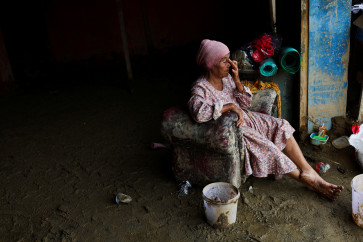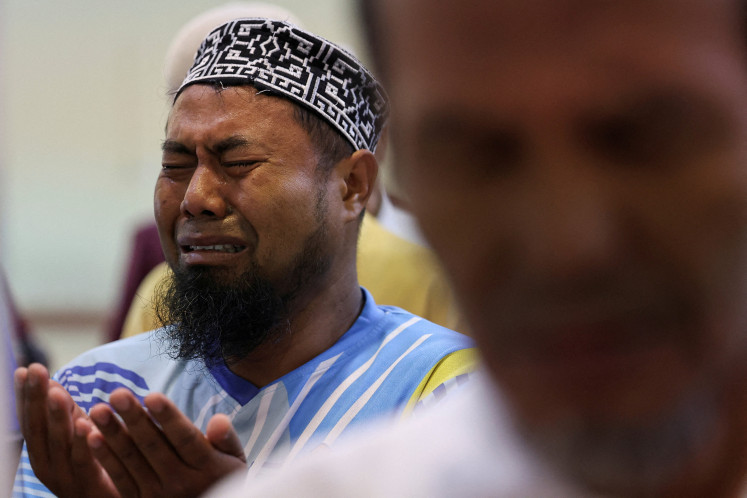Popular Reads
Top Results
Can't find what you're looking for?
View all search resultsPopular Reads
Top Results
Can't find what you're looking for?
View all search results'Jalanan' wins best documentary at Busan festival
Ho performs inside a public bus in Jalanan
Change text size
Gift Premium Articles
to Anyone
 Ho performs inside a public bus in Jalanan. (Courtesy of Busan Film Festival)" border="0" height="341" width="511">Ho performs inside a public bus in Jalanan. (Courtesy of Busan Film Festival)
Ho performs inside a public bus in Jalanan. (Courtesy of Busan Film Festival)" border="0" height="341" width="511">Ho performs inside a public bus in Jalanan. (Courtesy of Busan Film Festival)The appreciation was high as Jalanan (Streetside), an Indonesian documentary directed by Daniel Ziv, won a Busan International Film Festival (BIFF) Mecenat Award for the best documentary at BIFF 2013.
âThe jury recognizes the film for its humanizing and respectful look into the class system of Indonesia, told through its heartwarming and redemptive characters in a non-sentimental fashion,â the jury said in a statement on Saturday.
Jalanan tells the stories of Titi, Ho and Boni - three street buskers in Jakarta - over the course of five years. The film records how their lives change and how those changes are rooted in the spirit of the streets.
As a Canadian, Ziv moved to Jakarta to work in journalism, founding the magazine Djakarta! and writing a book called Jakarta Inside Out. In 2006, he had the idea of filming street buskers.
âBack then what I wanted to make was a short documentary using a camcorder,â said Ziv. âBut as I got closer to the busker community, I realized this was not just a story about busking, but could touch upon universal issues about Indonesia and globalization. It couldnât be in the form of a short film.â
The filming of Jalanan got serious when it attracted funding by major international film funding institutions. âI used my first grant to buy a camera,â said Ziv.
Ziv went on and off the Metro Mini in Jakarta searching for subjects.
âI met Titi in Bulungan, Blok M and soon after that I met Boni and Ho. I knew what I was searching for: street buskers with strong personalities, something to say, interesting stories and composers of their own songs.â said Ziv.
Many of the scenes in Jalanan are set under a bridge in Tosari where Boni lives. âThatâs the place we always met every time Daniel called for filming,â said Ho. âAfter five years, Boni still lives there. It is his world.â
Ho, with his husky voice and dreadlock hair, is an aspiring husband. He dreams of becoming a good husband who provides for his family. Titi is a mother of three who is keen to finish high school education through the governmentâs Paket C program. While Boni looks happy simply being on the street.
The film never seems to dictate to the subjects what to do in front of the camera, let alone on what to do in life.
With more than 200 hours of footage, Ziv required a visionary editor. He asked Ernest Weiss-Haryanto, an Ubud-based filmmaker, to join the team for this task. âErnest gives the film a sense of time and place, selecting the super long total footage into highly effective storytelling,â Ziv said.
Ernest spoke about the filmâs close. âThe close shows for whom we are making this film: for Indonesians.â
As the film proceeds, every character seems to find the closure in their stories - illusions of a happy ending. Ho gets to know a woman with three kids. âBut three kids donât automatically mean happiness. In fact, it gives you more mouths to feed. More work to do.â
 Ho performs inside a public bus in Jalanan. (Courtesy of Busan Film Festival)<)
Ho performs inside a public bus in Jalanan. (Courtesy of Busan Film Festival)<)
Ho performs inside a public bus in Jalanan. (Courtesy of Busan Film Festival)
The appreciation was high as Jalanan (Streetside), an Indonesian documentary directed by Daniel Ziv, won a Busan International Film Festival (BIFF) Mecenat Award for the best documentary at BIFF 2013.
'The jury recognizes the film for its humanizing and respectful look into the class system of Indonesia, told through its heartwarming and redemptive characters in a non-sentimental fashion,' the jury said in a statement on Saturday.
Jalanan tells the stories of Titi, Ho and Boni - three street buskers in Jakarta - over the course of five years. The film records how their lives change and how those changes are rooted in the spirit of the streets.
As a Canadian, Ziv moved to Jakarta to work in journalism, founding the magazine Djakarta! and writing a book called Jakarta Inside Out. In 2006, he had the idea of filming street buskers.
'Back then what I wanted to make was a short documentary using a camcorder,' said Ziv. 'But as I got closer to the busker community, I realized this was not just a story about busking, but could touch upon universal issues about Indonesia and globalization. It couldn't be in the form of a short film.'
The filming of Jalanan got serious when it attracted funding by major international film funding institutions. 'I used my first grant to buy a camera,' said Ziv.
Ziv went on and off the Metro Mini in Jakarta searching for subjects.
'I met Titi in Bulungan, Blok M and soon after that I met Boni and Ho. I knew what I was searching for: street buskers with strong personalities, something to say, interesting stories and composers of their own songs.' said Ziv.
Many of the scenes in Jalanan are set under a bridge in Tosari where Boni lives. 'That's the place we always met every time Daniel called for filming,' said Ho. 'After five years, Boni still lives there. It is his world.'
Ho, with his husky voice and dreadlock hair, is an aspiring husband. He dreams of becoming a good husband who provides for his family. Titi is a mother of three who is keen to finish high school education through the government's Paket C program. While Boni looks happy simply being on the street.
The film never seems to dictate to the subjects what to do in front of the camera, let alone on what to do in life.
With more than 200 hours of footage, Ziv required a visionary editor. He asked Ernest Weiss-Haryanto, an Ubud-based filmmaker, to join the team for this task. 'Ernest gives the film a sense of time and place, selecting the super long total footage into highly effective storytelling,' Ziv said.
Ernest spoke about the film's close. 'The close shows for whom we are making this film: for Indonesians.'
As the film proceeds, every character seems to find the closure in their stories - illusions of a happy ending. Ho gets to know a woman with three kids. 'But three kids don't automatically mean happiness. In fact, it gives you more mouths to feed. More work to do.'
Three street buskers in Jalanan (from left to right) are Boni, Titi and Ho. (Courtesy of Busan Film Festival)
'The same thing goes for Titi, who looked very happy after getting her Paket C high school diploma. But what can you do with a high school diploma in Jakarta?' Ernest sees the close of the film not as a conclusion, but more of a satire from an Indonesian point of view.
For Ho, getting married doesn't keep him away from the street. 'Now I play in a band, and you might see that as kind of a step ahead from busking in the street, but I still keep busking in the street, that's where the spirit is,' said Ho. Titi is also still active in street performances in Bulungan.
Jalanan features original songs from Ho, Titi and Boni as its soundtrack. One of the songs will be soon be heard on the radio. 'The soundtrack is an attempt to convey the film from the very point of view of the subjects and the streets,' said Ziv.
Before Jalanan premiered in Busan, another version of the same story, called Street Ballad: A Jakarta Story, was released for American television. This version is less than one hour and is told in the style of a TV documentary.
Asked about how making a different version of the same story affected the story telling, Ziv said: 'It's impossible to maintain all the story elements. We had to concentrate on one subject only, which was Titi.'
Aside from Jalanan, South Korean documentary Non-Fiction Diary also received a BIFF Mecenat Award for its strong political statements.
In Indonesia, Jalanan will have a special screening at the Ubud Writers & Readers Festival, this October.
The Busan festival's biggest prizes went to Pascha by South Korean director Ahn Seonkyoung and Remote Control by Mongolia's Sakhya Byamba. The organizers said Pascha, an unusual love story between a 40-year-old woman and a 19-year-old man, won the jury's heart with its highly original expression while Remote Control neatly portrayed tensions between reality and fiction.










